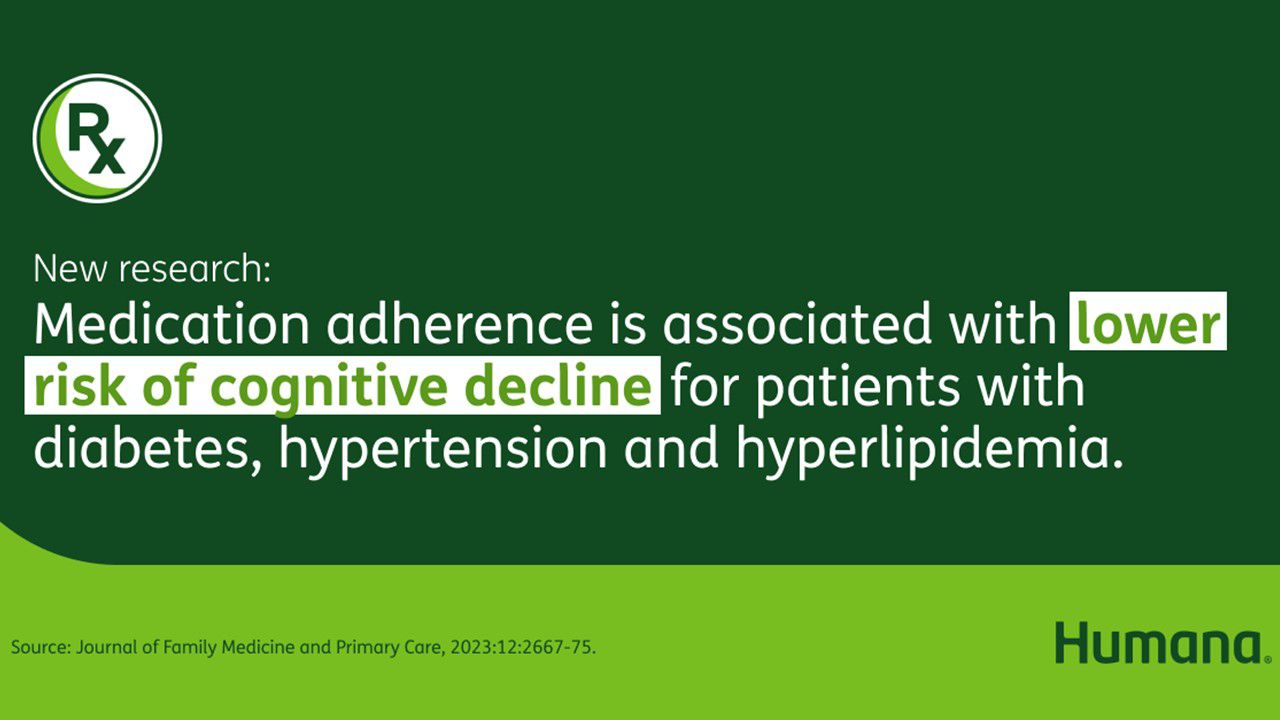Living with multiple chronic conditions can be challenging. You may need to manage multiple doctors and a variety of medications. Common chronic conditions for aging adults include type 2 diabetes, hypertension (high blood pressure) and hyperlipidemia (high cholesterol). Staying on track with medication and prescribed therapies is one way to protect your health, now and in the future.
Cognitive decline in the United States
In the United States, there are approximately 7 million adults, 65 years and older, living with Alzheimer’s disease or dementia, and approximately 12% of adults report subjective cognitive decline. Research suggests that chronic conditions may contribute to increased risk of cognitive decline, including Alzheimer’s disease and dementia.
Can medication reduce risk of cognitive decline?
Medication adherence
Three easy ways to stay adherent would be to fill prescriptions within a month of a doctor’s visit, refill medications on time (so you don’t run out) and take medications as prescribed at least 80% of the time (don’t miss or skip meds more than 6 days in a month).
Medication nonadherence and cognitive decline
Study results were eye-opening. Patients who missed one medication adherence measure compared to those who didn’t miss any, had a 23% increased risk of cognitive decline, 27% increased risk of Alzheimer’s disease and 33% increased risk of dementia. Patients who missed 2-3 medication adherence quality measures had almost twice the increased risk for developing Alzheimer’s disease and 58% increased risk of dementia. Patients who missed 4 or more adherence measures had the greatest odds of cognitive decline with double the risk of dementia and 148% increased risk of Alzheimer’s.
What can healthcare providers do to help?
Medication nonadherence, chronic conditions and cognitive decline do not exist in a silo. There may be many reasons that a patient is nonadherent. But an understanding of the relationship between multiple medication adherence and cognitive outcomes provides value to primary care providers who work with patients to mitigate adherence barriers.
Healthcare providers, including physicians, payors and pharmacy providers, can help to remove barriers to medication adherence by promoting strategies such as electronic prescribing 90-day supplies for chronic medications, automatic refills, medication delivery, easy to open medication containers, medication reminder tools, financial assistance and periodic medication reconciliation.
Key takeaway
Study results suggest that a focus on staying consistent with taking prescribed medications may offer an avenue for supporting better cognition-related outcomes. Filling prescriptions promptly after a doctor’s visit and getting refills on time so that you never run out of meds will help support medication adherence. The Center for Medicare and Medicaid Services (CMS) supports medication adherence and so do your partners in care at Humana.
Future research could explore the relationship between outreach efforts to patients who miss medication adherence quality measures and cognitive changes over time.
The HHR study referenced above: Racsa PN, Booth TA, Chung LN, Dixon SW, Poonawalla IB. Association of medication adherence quality measures for diabetes, hypertension, and hyperlipidemia with cognitive decline. Journal of Family Medicine and Primary Care, 2023:12:2667-75.
To explore additional studies conducted by Humana Healthcare Research, visit



